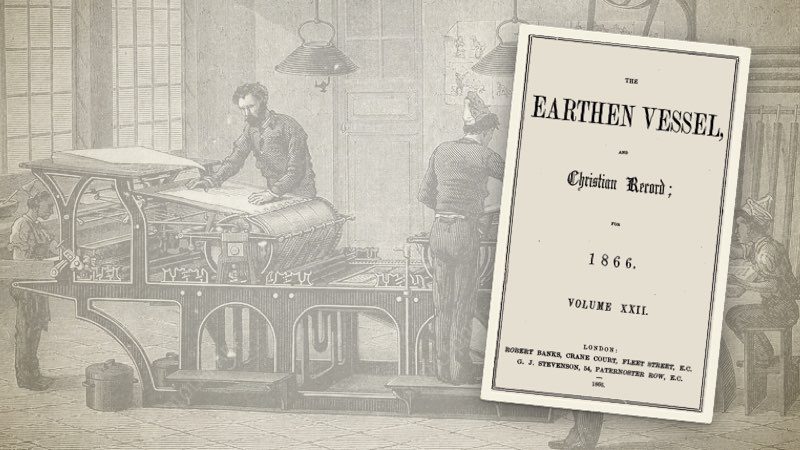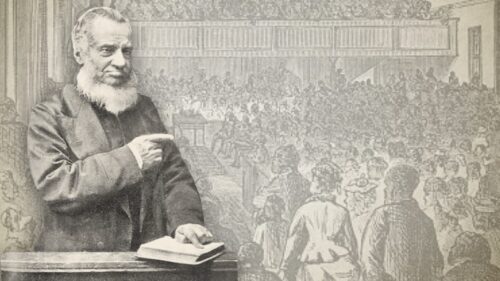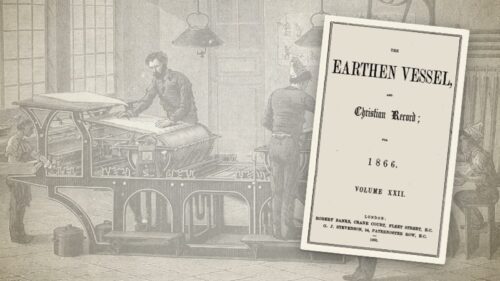
In Defense Of Strict Communion
Earthen Vessel, 1846:
Christian Reviewer.
Review of a Pamphlet entitled “Seven Reasons for Free Communion at the Table of the Lord, with all them that love our Lord Jesus Christ in sincerity.” By Cornelius Elven.
With the view of giving our readers at once a fair and a concise view of the positions really assumed by the writer of this “sevenfold” defence of open communion, we will enumerate, in fewer words than our author uses, his various propositions, and endeavour, (praying for the blessed guidance of the Holy Spirit,) to show their fallacious and sophistical character. Mr. Elven affirms either directly, or by inevitable implication, the following things:—
1.—That strict communion is not “christian communion,” but that free communion is:—2. That unbaptised believers ought to be admitted to the ordinance of the Lord’s Supper, but ought not to be admitted to church membership.—3. That one part of the beatitudes of heaven, will consist of the freedom of the glorified, from “the trammels of strict communion.”—4. That “strict communion is at variance with the genius of the gospel, which is emphatically ‘love.’”—5. That (in the author’s case) strict communion principles, and “divine affection implanted in the soul by the Holy Ghost,” have long been at “painful conflict.”—6. That strict communion is, “like all ultraisms in theology,” sought to be sustained “by the monopoly of a few perverted texts.”—7. If Baptists exclude unbaptised believers from their Communion Tables, they ought to exclude unbaptised preachers from their pulpits.—8. That for a christian to be baptised “without light” as to his obligation, would prove him unfaithful to his own conscience, and a transgressor against God.—9. We have no evidence that the first communicants were baptised, therefore they were not baptised before communicating.—10. Tested by the word of God, “strict communion is weighed in the balance and found wanting.”—11. Strict communion is unjust, as it equally excludes the unbaptised saint, and the drunkard or blasphemer,—12. That the primitive christians celebrated the death of Christ by the breaking of bread, when no assembled in a church capacity.
Here are twelve propositions, but we confess we have looked in vain for the “seven reasons” spoken of in the title-page. We cannot imagine that Mr. Elven would willingly deceive the public, but certainly he has virtually misled us, for we expected “seven reasons,” and down to the present moment have failed, after diligent search, to discover even the fraction of a “reason,” properly so called. But, in order that we may not pronounce judgment without the production of sufficient evidence, we now solicit the calm and serious attention of our readers while we submit to their consideration the following examination of the various points which we have gathered from Mr. Elven’s pamphlet.
1. [That strict communion is not “christian communion,” but that free communion is.]
If this be true, then is anti-Christ enthroned in Mr. Elven’s own church, and Mr. E. Has announced his intention of submitting to his own church rule of “strict communion,” until his people see fit to alter their plan. This is rather like sacrificing truth upon the altar of expediency. If Mr. Elven’s statement be true, his conduct is culpable. But that any minister of the gospel should dare to say what the writer of this Tract has said, is positively awful to any mind made to feel the weight and solemn importance of the following portion of God’s holy word. Acts 2:41 & 42. “Then they that gladly received his word” (here is living faith) “were immersed,” (here is believers’ baptism,) “and they” (the immersed believers and none else,) “continued stedfastly in the apostles’ doctrine and fellowship, and in breaking of bread (or the Lord’s Supper) and in prayers.” If this was the order of things when the apostles were “filled with the Holy Ghost,” (ver. 4) how much it becomes men, in our days, who profess to bear “the vessels of the Lord,” to shrink from anything and everything which would introduce another form of order into the baptised churches of Christ, and even pronounce that New Testament “order” the work of anti-Christ, and the offspring of narrow-mindedness and superstition. The Holy Ghost then instituted strict communion, and recorded its institution for our guidance and instruction. But Mr. Elven says, that order of things is not christian communion. “We ought to obey God rather than man.”
2. [That unbaptised believers ought to be admitted to the ordinance of the Lord’ s Supper, but ought not to be admitted to church membership.]
Here is fleshly wisdom on the heels of mere fleshly charity. By what rule can this advocate for “mixed communion” consistently exclude from the church meeting the very parties who commune with him statedly. He says they should conic to the type, because they have partaken of the thing typified, and to the shadow as they enjoy the substance by vital faith, then does it not necessarily follow that if they are evidently destined for the great church meeting above, they are worthy of admission to the church meetings in “Garland Street, Bury Saint Edmunds?” “No,” says Mr. Elven, they may come to meet my Lord and Master at the supper; their disobedience to a plain commandment of Christ’s does not disqualify them for the “Lord’s Supper,” but it does for “our church meetings!” Why, it seems Mr. Elven is a “strict” man after all in this matter. But herein lies a point of worldly wisdom. (Page 7 explains all:) there we read that the same parties who may come to the table, are not to come to the church meeting, because they might interfere in “Electing Officers, Making or Renewing Trust Deeds,” &c. Yes! Yes! To cast a practical contempt upon the ordinance of believer’s baptism is nothing in some eyes, compared with coming to the church meetings to meddle with money matters! If this is not opposed to the “wisdom that is from above,” what is, or what can be?
3. [That one part of the beatitudes of heaven will consist of the freedom of the glorified from “the trammels of strict communion.”]
If “strict communion” be warranted by apostolic example, and who with his eye on Acts 2:41 & 42, can truly assert that it is not? What is this but a mere flourish in which there is neither weight nor value? It may be convenient to get a long distance from the point in dispute; but Mr. Elven’s book, professing to treat on a matter of gospel church order on earth, gains no point by speculating upon the enjoyment of the glory state. It is true that the labour of the ministry, the “trial of our faith,” and the “assembling of ourselves together” will cease on our removal from this present state, but ought they therefore to be decried and neglected now? That is the question, and to that point, in relation to scriptural communion, writers, on each side, will do well to confine themselves.
4. [That “strict communion” is at variance with the genius of the gospel, which is emphatically, love.]
Nothing which the apostles did under the direction of the Holy Spirit can be opposed to the genius of the gospel. The love which is not indissolubly united’ with a solemn adherence to the truth, as it is in Jesus, is not the love of the gospel. There is no true affection, either to Jesus or his people, in a practical encouragement of disobedience on their part to his easy and blessed commandments. He did not say “If ye love me,” countenance my saints in disobedience to my precepts. But, by the admission of the unbaptised to the Table of the Lord, we say, by our conduct (whatever we may say with our lips), “Believer, baptism is not requisite,” and the apostles “when filled with the Holy Ghost,” furnished an example unworthy of our imitation, and much inferior both in “love and wisdom” to the plan which our modern charity has espoused.
5. [That (in the author’s case) strict communion principles and “divine affection implanted in the soul by the Holy Ghost,” have long been at “painful conflict.”]
Until Mr. Elven has produced, from the practice or the language of the Lord Jesus Christ, or his holy apostles, a “Thus saith the Lord,” for the popular figment which he defends, he has no right to, affirm that the “affection” he speaks of was implanted by the Holy Ghost. The spirit of all truth never implants affections in the soul at variance with his own instituted order in the church of theRedeemer. Error may often be detected by tracing it to its consequences. If men of old were moved by the Holy Ghost to set on “strict communion” principles for the imitation of the churches of the Saviour in all after ages, as they were, (and we firmly, but respectfully, challenge all men to deny it, and prove a contrary position to be tenable,) then all “affection” which prompts to an opposite course is any thing but an emanation from the ever-consistent and unerring Spirit.
6. [That strict communion is “like all ultraisms in theology,” sought to be sustained “by the monopoly of a few perverted texts.”]
Our respected author deals more largely in assertions than proofs. Nor are his readers furnished, in this place, with any illustrations of the “wresting of the Scriptures,” which is here affirmed. The charge of “perverting” the sacred oracle is a solemn and heavy one, particularly when brought against the primitive communionists by an advocate of “charity” and good-will, with a heart too large to be compressed within the limits of a strict communion creed. We are afraid that Mr. Elven’s heart bears a mark of disease, in being larger on one side than the other. For, speaking of his friends, to whom he has just gone over, he intimates, more or less directly, in his pamphlet, that they are scriptural-breathers of the atmosphere of holy love—and many other things most worthy and commendable. But the friends from whom he has just deserted, are stigmatised as inconsistent, unjust, and perverters of the Word of God! It is a good thing when the heart and the head act reciprocally and unitedly; but when the feelings master the judgment, there is no means of predicting the lengths to which a well-meaning, but mistaken writer, may go in the paths of error and confusion.
7. [“If Baptists exclude unbaptised believers from their communion table, they ought to exclude unbaptised preachers from their pulpits.”]
Allowing that in the occasional interchange of pulpits, which occur between baptised, and sprinkled brethren in the ministry, both parties are in the wrong, still practical contempt of the Lord’s ordinance of immersion would not be justified. Two wrongs can never make a right. But we dispute the soundness of Mr. Elven’s position. Baptists do not exclude their independent friends from the table. They exclude themselves by their refusal to comply with New Testament terms of Communion; and it is hard usage of the poor Baptists to charge them with that which cannot be fully laid to their account. They admit Pedo-baptist believers to social intercourse, and sanctuary services, (preaching, prayer, and praise,) because they are new creatures in Christ Jesus—and that is Scriptural; they likewise admit others to the Lord’s table because they are immersed believers—and that is also Scriptural; thus are they free from all charges of impropriety, or inconsistency.
8. [“That for a Christian to be baptised, ‘without light’ as to his obligation, would prove him unfaithful to his own conscience, and a transgressor against God.”]
This is a mere truism, which applies to all acts of christian obedience, and is altogether irrelevant to this subject. As Mr. Elven has introduced it, we will use it and commend it, in a slightly altered form, to his serious consideration—Without clear light from above, and a “thus saith the Lord,” in apostolic practice, (which Mr. Elven cannot adduce,) in defending the admission of the unbaptised to the Lord’s Supper “he is proved unfaithful to his own (enlightened) conscience and a transgressor against God.”
9. [“We have no evidence that the first communicants were baptised, therefore, they were not baptised before communicating.”]
It is natural that our readers should feel anxious to know whether this is indeed Mr. E.’s most illogical statement? Certainly it is. But as no direct statement is made in the New Testament, respecting the baptism of the eleven, to whom the Lord Jesus administered the typical elements at his last supper, we can only judge of the matter by implication and inference. We read that before the supper the apostles were baptist ministers; “Jesus baptised not, but his disciples;” therefore we conclude, and we believe most fully, that they had been baptised themselves, how else could they go forth and proclaim, “He that believeth and is baptised, shall be saved?” The natural reply, on Mr. Elvin’s hypothesis, to such a message would have been—”Thou that preachest that another should not neglect baptism, dost thou neglect it?” Oh! how God-displeasing must the man-gratifying and money-getting heresy of “open communion” be, when it seems necessary in its defence, to make the Lord’s holy apostles, appear like many hypocritical parsons of the present day, who, if they spoke the truth, would exclaim—”Do as we say, but not as we do.”
10. [“Tested by the word of God, strict communion is weighed in the balance. And found wanting.”]
We wish when Mr. Elven had said this, he had used the scales as well as talked about them. If he will, at his earliest convenience, prove, from the Scriptures, that his assertion is true, we most cheerfully promise to unite in the advocacy of his popular views; but until he does this, we abide by the testimony of the Holy Ghost in the 41st and 42d verses of the 2nd chapter of the Acts of the Apostles, and solemnly pronounce his statement, (however well meant,) to be condemnatory of apostolic practice, and insulting to the Holy Ghost; with whose sacred bedewings they were copiously blessed.
11. [“Strict communion is unjust, as it equally excludes the unbaptised believer, and the drunkard or blasphemer.”]
This is the concentrated essence of weakness itself. Do not Mr Elven, and his colleagues in modern liberality, exclude the unbaptised, and the ungodly, alike, from their “Church Meetings?” And again—but we cease; for how can we answer a proposition which asserts nothing, means nothing, and necessarily ends in nothing.
12. [“That the Primitive Christians celebrated the death of Christ by the breaking of bread, when not assembled in a church capacity.”]
This is supposed to be gathered from the passages which speak of “breaking bread from house to house.” But do we not read of the church in the house of Priscilla and Acquilia, (Romans 16:3,4,5.) “the church, in the house of Nymphas,” (Col. 4:15.) and “the church in the house of Philemon,” (2nd verse)? Still this is not the point in dispute. Mr. Elven has in our view treated his subject as some other preachers do theirs’; he has gone around it, towards it, and right away from it, but not at all into it. He has succeeded in showing that the most fertile imagination, and the most accommodating disposition, and the most lively genius, must ever fail in overturning the decisions of the Holy Spirit as to the doctrines and discipline of the church; in demolishing the bulwarks which the King of zion has placed around her; and in improving upon the gospel order of the ordained institutions of our Lord Jesus Christ. May the Lord’ s name be praised for this fresh failure of error, and disobedience; and this additional triumph of the strict, unchanging and ever blessed truth as it is in Jesus!
It may be argued the Strict and Particular Baptist churches of the 17th, 18th and early 19th centuries were at their strongest when they remained independent congregations, unaffiliated with Magazines and Societies. This strength was lost during the latter half of the 19th century when the churches clamored around favorite periodicals and regional associations. Although the Magazines were largely responsible for creating a party-spirit and culpable for stirring up needless controversy, they nevertheless contain many valuable resources which may prove a blessing for this generation. Although they differed on various points of doctrine, they invariably held to high views of sovereign grace, denouncing as heresy the pernicious teachings of Andrew Fuller. The majority of Strict and Particular Baptist churches during the 18th and 19th centuries were Hyper-Calvinists.






